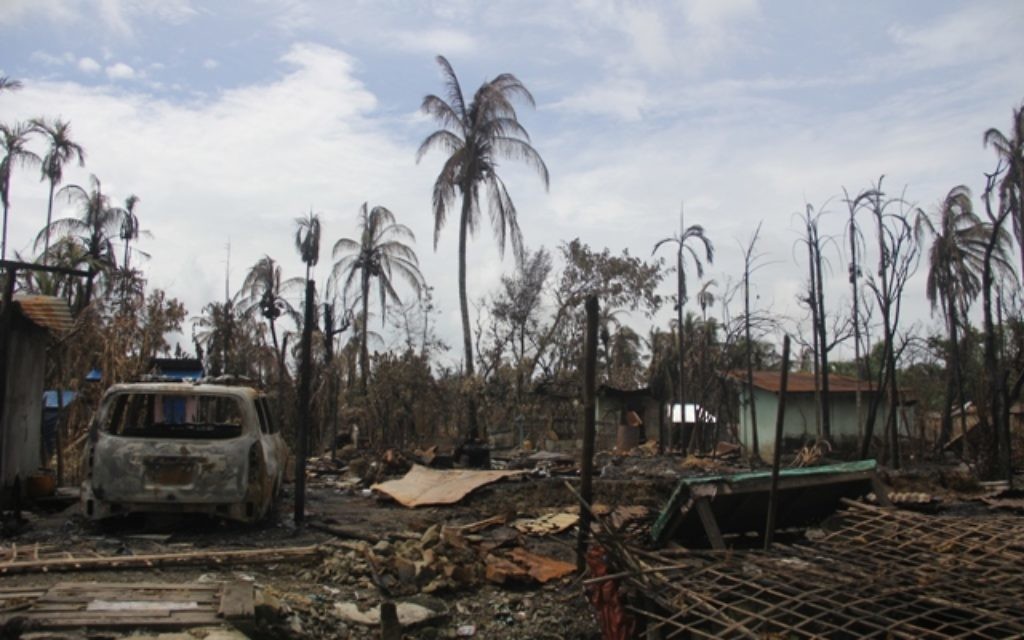Rosenthal: Why We Must Care About Refugees
The Rohingya people of Burma are suffering just as we suffered at the hands of Pharaoh.

What defines the Jewish people? While some have argued that Jews are defined as a race or a religion, Rabbi Jonathan Sacks, the former chief rabbi of the British Commonwealth, posits that the Jewish people are united over a common story — the story we tell ourselves every year about slavery and freedom.
Jews around the world share this common story when we read the Torah, when we bless the wine on Friday night and when we gather around the seder table at Passover. Through those words, through those memories, we are one.
The Exodus story is, at its core, a refugee story. We found our way down to Egypt, and we were oppressed there — subjugated, enslaved and abused. As people with different customs and a distinct identity, we were seen as a threat to the ruling power.
Get The AJT Newsletter by email and never miss our top stories Free Sign Up
Through the help of G-d, we were set free, and we traversed the wilderness looking for hope, security and a land we could call home. Each year we read this story and are reminded of who we are.
Today, most Jews in the United States are privileged to have put our years of persecution and wandering behind us and sit comfortably in the land we call home. But roughly 65.6 million refugees and displaced people in the world lack such privilege. Their homes have been torn apart by war, disease and famine.
Many are living their own exodus story, wandering their own wilderness across borders and into camps in search of refuge. Many have nowhere to go but nothing to go back to.
This is happening right now to the Rohingya people of Burma, an ethnic minority who have suffered brutal violence and persecution by the Burmese military in Rakhine state, where they have been burned, beaten, raped and murdered in their villages.
More than 688,000 Rohingya have fled to Bangladesh in recent months, carrying children, a few belongings and the memories of atrocities that are nothing less than ethnic cleansing.
As we hear the story of the Rohingya people, we feel the familiar pull of our own story. The Burmese military is acting like a modern version of Pharaoh, who also viewed an ethnic minority with contempt and fear: “And he said to his people, ‘Behold, the people of the children of Israel are more and mightier than we. Come on, let us deal wisely with them … and so get them out of the land’” (Exodus 1:9-10).
The Torah reminds us more than 30 times that we were strangers in the land of Egypt, and so we must never mistreat, abuse or ignore the stranger in our midst. The Torah is teaching us that we must do what we can to prevent the oppression of others.
We learn a similar lesson from a modern chapter of the Jewish story: if only world powers had done more when the Nazis occupied Europe and launched the atrocities they perpetrated against the Jews and others during World War II.
When the nations of the world had an opportunity to provide refuge to the Jews to prevent their annihilation, they closed their borders and were silent. Because of this complicity, the Nazis weren’t the only people responsible for the murder, starvation and death by disease of millions of souls. As the great theologian Abraham Joshua Heschel said, “Few are guilty, but all are responsible.”
Today, we are being given the same test. Rohingya activists are asking for humanitarian aid, sanctions and accountability for the perpetrators of the violence. The bipartisan Burma Human Rights and Freedom Act (S.2060) in the Senate is one way the United States can respond to that call. We should all urge Sens. Johnny Isakson and David Perdue to co-sponsor the bill.
Our story, our history, our spiritual life all scream at us to not sit idly by. We must act.
Whether it is within our community or a world away, the plight of persecuted minorities must be a top concern for all who share in the Jewish story. To do nothing is an abomination to the Almighty and an affront to the memory of our history.
Rabbi Laurence Rosenthal is one of the rabbis at Ahavath Achim Synagogue. He was an American Jewish World Service rabbinic fellow from 2014 to 2015 and serves on the AJWS Leadership Council of Atlanta.




comments